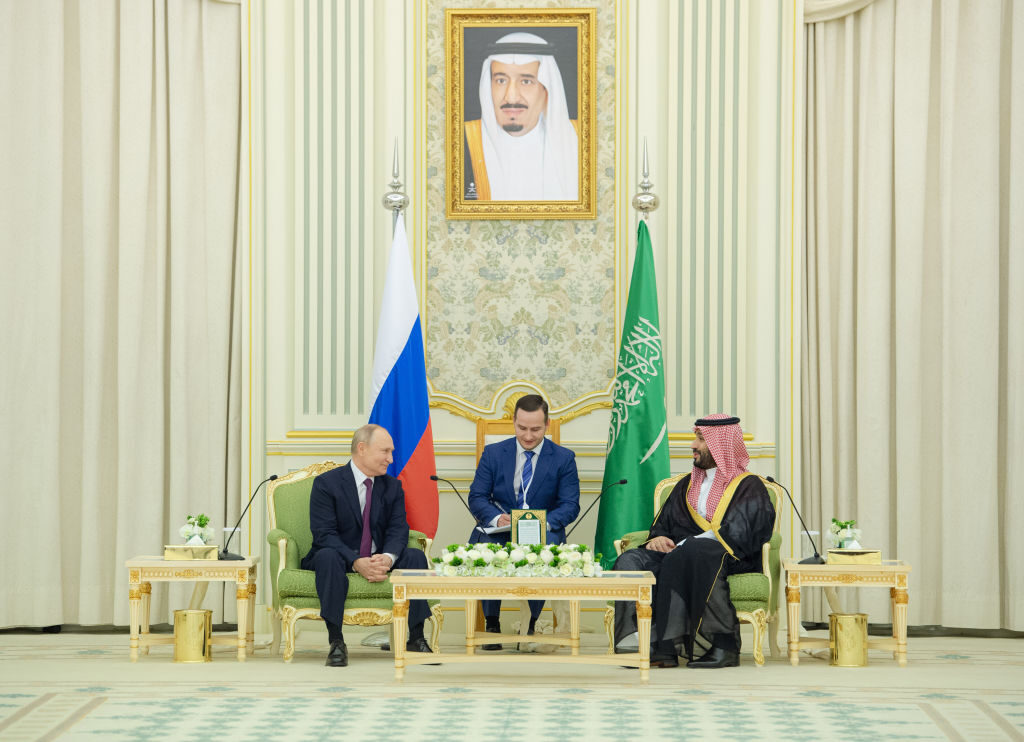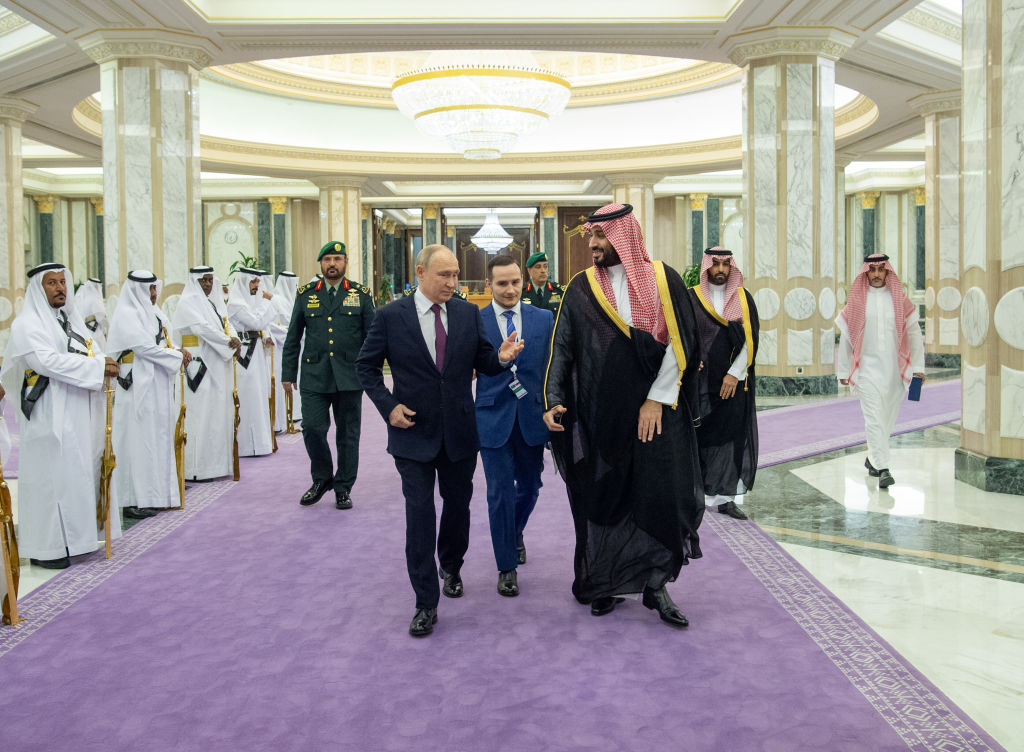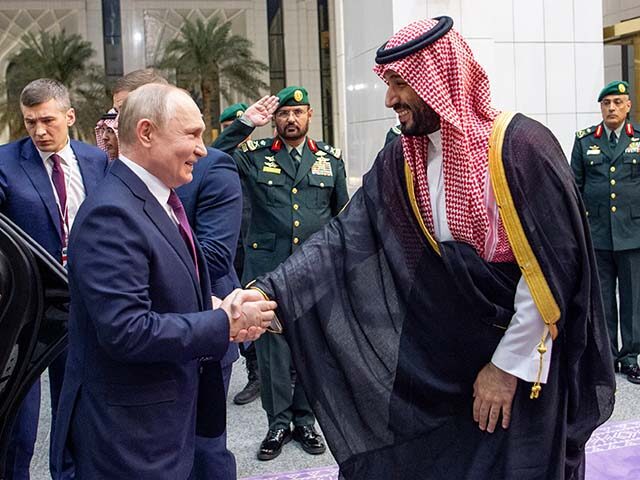Russian strongman Vladimir Putin and Saudi Crown Prince Mohammed bin Salman said on Thursday that the two countries would pressure fellow members of OPEC+ to “adhere” to their agreements “in a way that serves the interest of producers and consumers,” a sign the two would join to pressure smaller member nations to keep production reduced.
The commitment followed an in-person meeting between bin Salman and Putin in Riyadh, where Putin arrived for a short Middle Eastern trip that included both Saudi Arabia and the United Arab Emirates.

Saudi Arabian Crown Prince Mohammed bin Salman (R) meets with Russian President Vladimir Putin (L) at Al Yamamah Palace in Riyadh, Saudi Arabia, on December 06, 2023. (Royal Court of Saudi Arabia / Handout/Anadolu via Getty Images)
The Kremlin published a long joint statement from the two countries on Thursday after their meeting, touching on a variety of subjects including the conflict between Israel and the Hamas terrorist organization, Russia’s invasion of Ukraine, and cooperation in agriculture, space, and trade. Bin Salman welcomed Putin warmly, proclaiming him a “cherished guest” of Saudi Arabia. Putin, in turn, celebrated the positive relations between his country and Saudi Arabia as unprecedented.
“In the field of energy, the two sides commended the close cooperation between them and the successful efforts of the OPEC+ countries in enhancing the stability of global oil markets,” the joint statement read. “They stressed the importance of continuing this cooperation, and the need for all participating countries to adhere to the OPEC+ agreement, in a way that serves the interests of producers and consumers and supports the growth of the global economy.”
Russia and Saudi Arabia collectively represent about a fifth of the world’s daily oil production, the news agency Reuters noted Thursday. They are also the most influential members of OPEC+, a broader organization including the core members of the Organization of the Petroleum Exporting Countries (OPEC) and 11 other high-producing oil powers, most prominently Russia and Mexico. Collectively, OPEC+ holds about 90 percent of the world’s known oil reserves.

Saudi Arabian Crown Prince Mohammed bin Salman (R) welcomes Russian President Vladimir Putin (L) at Al Yamamah Palace in Riyadh, Saudi Arabia, on December 06, 2023. (Royal Court of Saudi Arabia / Handout/Anadolu via Getty Images)
The two countries have spent much of the past two years trying to curb global oil supplies to keep prices from falling too low, hurting their domestic economies. The two led OPEC+ countries to agree to a dramatic production cut of 2 million barrels of oil a day in October 2022, making headlines as President Joe Biden had visited Saudi Arabia the summer before and was widely believed to have attempted to convince Mohammed bin Salman to increase production.
A week before Putin’s visit to Saudi Arabia, OPEC+ agreed to another new cut of 2.2 million barrels per day (bpd), but the move did little to increase oil prices, in part because of rumored divisions between OPEC+’s larger powers and smaller African nations seeking to not lose their share of the market.
Reuters, reporting on the joint statement out of Riyadh, said “oil market sources” interpreted the comment on “adhering” to commitments as a “message to members of the OPEC+ club who had not cut or not cut enough,” given widespread rumors of disagreement between the larger OPEC+ countries and smaller ones. The absence of a major price drop this week is in part a response to the perception that OPEC+ is not united in its commitment to cuts.
“The market is starting to price in the possibility that Opec may no longer remain cohesive and does not implement these cuts,” Martijn Rats, chief commodities strategist at Morgan Stanley, told the Financial Times on Wednesday.
A report published by Bloomberg on Friday agreed, naming Angola and Iraq as two of the nations most resistant to oil production cuts.
“Last week, Moscow announced it would slash oil exports by 500,000 barrels a day in the first quarter. Saudi Arabia would have preferred that Russia commit to a further output cut but couldn’t convince leadership,” Bloomberg reported. “Angola refused to accept its new output target for next year and intends to pump about 70,000 barrels a day more than its allocated limit. Iraq may struggle to deliver its promised cut, especially if it finally reaches an agreement over exports of crude from its northern Kurdish region through Turkey.”
The perceived hidden discord and the nature of the latest round of cuts have resulted in little movement in the price of oil despite the cuts. According to Bloomberg, the announced OPEC+ cuts of 2.2 million bpd included several prior commitments, meaning the new cuts are only about “a third of the promised amount.”

COMMENTS
Please let us know if you're having issues with commenting.